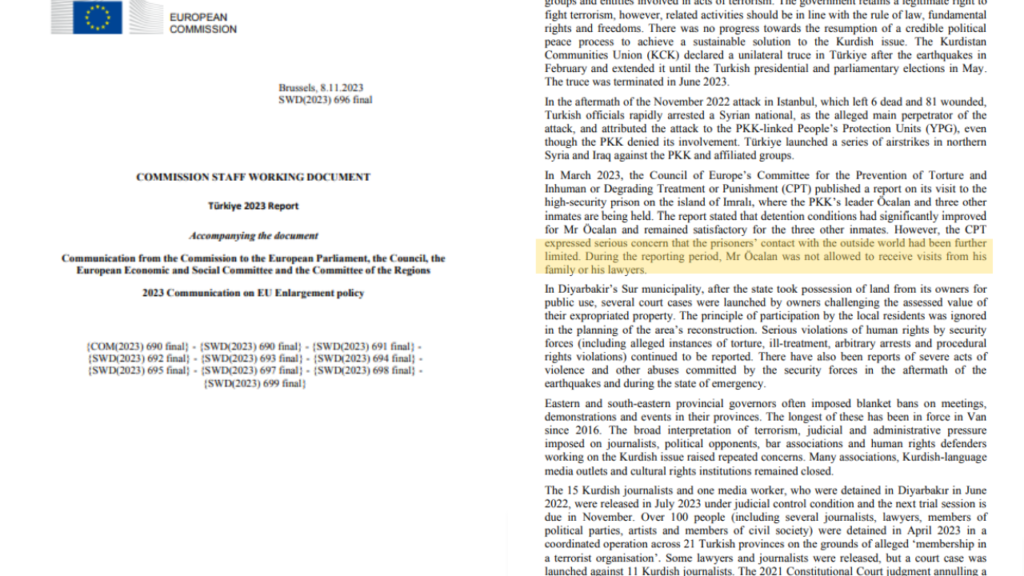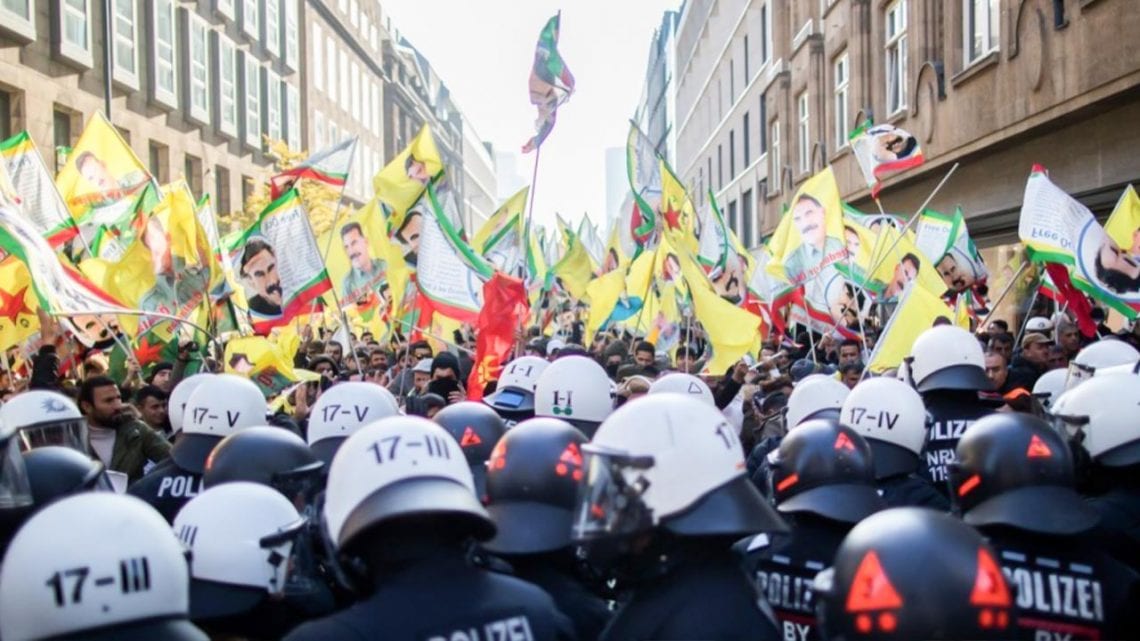Jürgen Klute
The Kurdistan Workers’ Party (PKK) and its co-founder and long-time leader Abdullah Öcalan have been on the US and EU terror list for many years. Öcalan was arrested in 1999 and handed over to Turkey. There he was initially sentenced to death. As part of the accession negotiations between Turkey and the EU that began shortly afterwards, the death sentence was commuted to life imprisonment in 2002. For around three years, Öcalan, who is being held on the prison island of İmralı in the Sea of Marmara, has had no contact with his family or his lawyers. This situation is confirmed in the EU Commission’s Turkey Report 2023 (p. 18).
The Middle East is currently being shaken by various armed conflicts that are interlinked in a complex manner. In addition, the countries of the Middle East, whose economic basis is the production and export of gas and oil, are facing enormous challenges as a result of the rapid phase-out of fossil fuels, which is necessary for climate policy reasons.
Against this backdrop, an end to the armed conflicts and a political-diplomatic solution to these conflicts is urgently needed. The conflict between the Kurds and the Turkish state plays a central role in such a peace process, even though the Kurdish settlement areas extend across a total of four states. For a brief period in 2013, it looked as if the decades-long armed conflict between the PKK and Turkey would finally lead to a peace process. However, the Turkish government cancelled this process in 2015 and has been regularly attacking Kurdish settlement areas close to the border in northern Syria and northern Iraq ever since. Turkey justifies its cross-border attacks – which violate international law – with the need to defend itself against the PKK, which it classifies as a terrorist organisation.
A precondition for reviving the peace process that Turkey has broken off would be an end to Turkish attacks on Kurdish settlement areas and also rhetorical disarmament in the form of the PKK no longer being described as a terrorist organisation but being accepted as a negotiating partner by the Turkish side, as well as the release of Öcalan or at least treatment in line with international standards and the release of imprisoned Kurdish politicians, journalists, lawyers and human rights activists.

As Turkey currently shows no willingness to do this, political pressure from outside would be necessary to make the Turkish government rethink its position. Around 15 years ago, this was hardly conceivable. However, there are now signs in the EU and the USA of a rethink in the assessment of the PKK and the Kurdish struggle for political and cultural self-determination.
In September 2017, the Belgian Court of Appeal (Cour d’appel) in Brussels ruled that the PKK is not a terrorist organisation, but a party to an internal armed conflict, i.e. a civil war. The German-language public Belgian news portal Flanderninfo wrote about the judgement at the time: “This judgement is the first of its kind in the European Union to qualify the Turkish-Kurdish conflict as a civil war and not as a terrorist matter. According to the Belgian judiciary, the international law of war must be applied here, as this civil war is an armed conflict. The lawyer of the PKK defendants in Brussels expressed satisfaction on behalf of his clients that the Belgian judiciary considers this conflict to be a civil war.”
In the aforementioned Turkey Report 2023, the European Commission also finds quite clear words on the human rights situation in Turkey and in the Turkish penal system in several passages. The report emphasises that the PKK is still on the EU terror list and acknowledges Turkey’s right to protect itself against terror. At the same time, the report calls on Turkey to adhere to international standards and the principle of proportionality. The Turkey Report 2023 also points out that Turkey has not yet complied with multiple requests from the Council of Europe and its Committee for the Prevention of Torture to ensure that human rights are respected. The EU Commission thus confirms the accusations frequently levelled by Kurds and other members of the opposition in Turkey against the Turkish state, the Turkish security forces and the Turkish judiciary for ignoring human rights.
While the EU Commission’s report on Turkey is still diplomatically moderate in its assessment of the human rights situation, the report ‘Global Terrorism Threat Assessment 2024’ published a few days ago by the Centre for Strategic and International Studies (CSIS) in Washington has clearer words.

The authors of the report tend to see Turkey as responsible for the instability in the region. On page 80, it states: “The Turkish government has expanded its campaign against Kurdish groups beyond its borders. The number of attacks in Turkey has decreased since 2020, but violence between Turkish forces and Kurdish armed groups outside of Turkey has increased dramatically in the same period.[40] The Turkey-PKK conflict continues to drive regional instability and, indirectly, terrorism in the wider Middle East. Turkey has escalated its rhetoric against Kurdish nationalist groups, including the People’s Defence Units that comprise a sizable portion of the US-supported *Syrian Defence Forces (SDF).” [ed: *Syrian Democratic Forces]
Furthermore, the authors write:
“Terrorist attacks pose a minor threat inside of Turkey, although the Turkey-Kurdish conflict remains a major driver of violence and instability in the wider region. […] This decrease in terrorist violence within Turkey has occurred alongside a substantial increase in conflict between Turkey and the PKK in Iraq. The PKK poses no direct threat to Western countries other than Turkey. […] The PKK threat to Turkish territorial integrity is also questionable. The group lacks the capabilities to directly challenge the Turkish military as has been made repeatedly clear during Turkey’s interventions into northern Syria and northwest Iraq. The PKK officially accepts the current borders of Turkey and has replaced its demands for independence with calls for greater self-determination. The PKK currently espouses an ideology Öcalan calls ‘democratic confederalism’, which attempts to achieve self-determination without questioning the existing political borders. The PKK’s public statements at least suggests that the group poses no meaningful threat to Turkish territorial integrity.”
The authors of this CSIS report ultimately confirm with their analysis what the Belgian Court of Appeal found on the PKK in 2017: it is not a terrorist group. In fact, the PKK poses no threat to the USA or the European Union. Nor does it threaten Turkey’s territorial integrity. If all these assessments are taken seriously, then there is no longer any reason why the PKK should not finally be removed from the US terror list and the EU terror list. This would open the door to the revival of an urgently needed peace process in Turkey and ultimately in the entire Middle East, because the destabilising effect of this conflict would come to an end. Removing the PKK from the aforementioned terror lists would be a clear political signal to the Turkish government to engage in a revitalisation of the peace process. Without such a signal, it is unlikely to do so. Political initiatives should be developed and pursued with this aim in mind.
Jürgen Klute is a former Die Linke (The Left) MEP and spokesman for the Kurdish Friendship Group in the European Parliament from 2009 to 2014. He is editor of Europa.blog and a columnist for Medya News.










